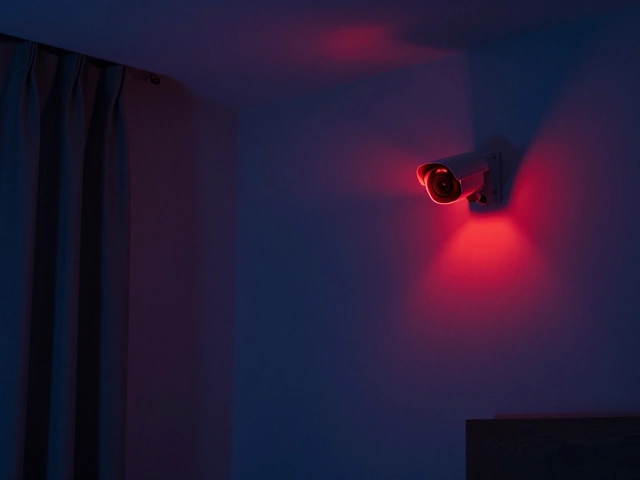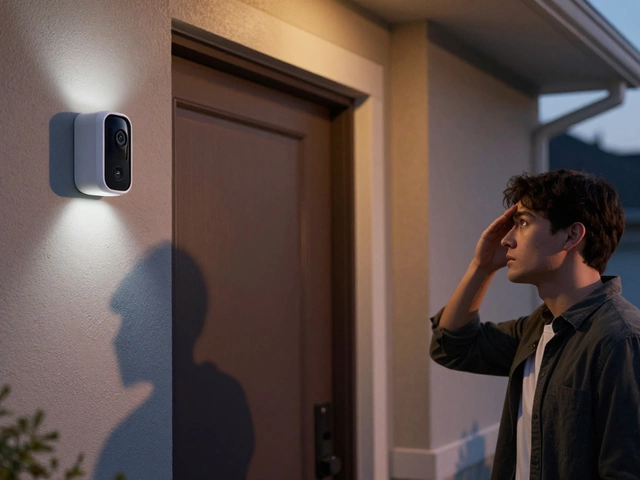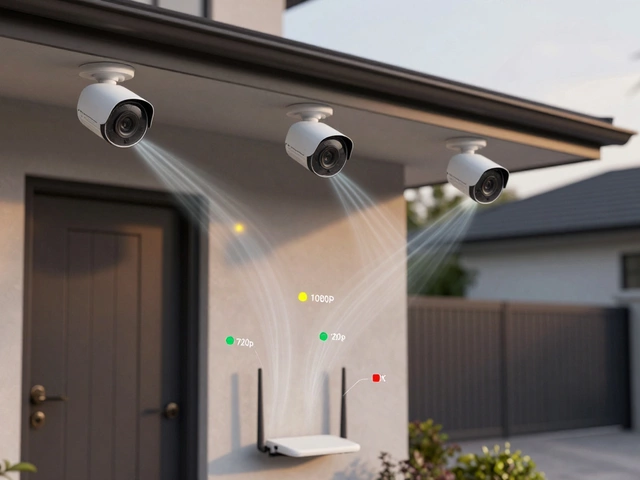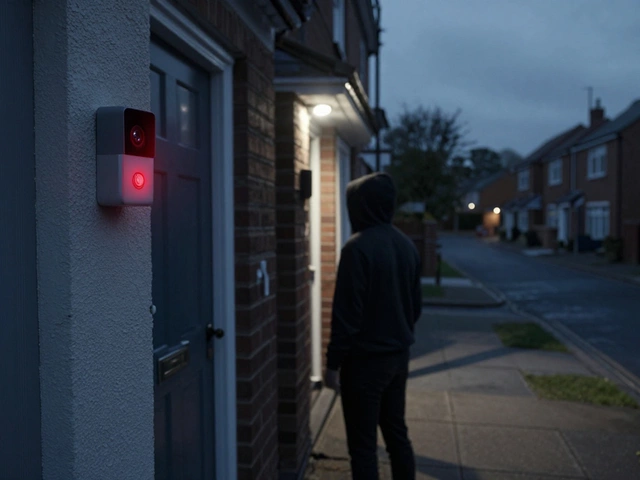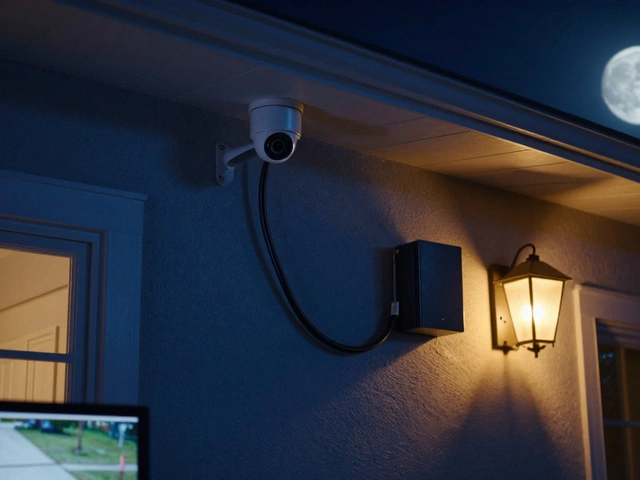CCTV Installation Cost Calculator
$0
All figures are in USDWhen you ask CCTV installation cost, you’re not just wondering about the price of a camera. You’re asking if it’s worth it, how much time it’ll take, and whether you’re getting ripped off. The truth? There’s no single answer. A basic setup in a small house might cost less than a monthly phone bill. A business system could run as much as a used car. Let’s cut through the noise and show you exactly what you’re paying for - and why.
What’s Actually in the Price?
CCTV isn’t just cameras and wires. It’s a system. That means you’re paying for four things: equipment, labor, storage, and extras. Most people forget about the last two - and end up surprised later.Equipment costs vary wildly. A simple 1080p camera runs $150-$400. If you want PTZ (pan-tilt-zoom) that tracks movement? That jumps to $800-$3,000 per camera. Analog HD cameras are cheaper - $100-$300 - but they’re older tech and don’t work with modern smart apps. For most homes, 1080p is the sweet spot. For businesses, 4K is becoming standard, but it adds 15-20% to the price.
Then there’s the NVR or DVR. This is the brain of your system. It stores footage. Basic models start at $100. For 16 cameras with 30 days of storage? You’re looking at $400-$500. And if you want cloud storage? That’s $3-$30 per camera, every month. No one tells you this upfront - but it adds up fast.
Mounting hardware? $15-$300. Power cables? $20-$100. Weatherproofing for outdoor cameras? Another $50-$150 per unit. These aren’t optional. Skip them, and your system fails in rain or snow.
Professional Installation: Is It Worth It?
You can buy a camera and stick it on a wall with duct tape. But 73% of DIY systems fail within a year, according to John Smith, CTO of SecurityCam Solutions. Why? Bad angles, weak Wi-Fi, wrong lighting, no power backup.Professional installers don’t just drill holes. They plan the whole system. They check for blind spots. They run wires through walls without ruining your drywall. They connect everything to your phone securely. And they make sure the footage is usable if something happens.
For a 4-camera home system, labor runs $600-$1,200. That’s $150-$300 per camera. In New York or California? You’ll pay $200-$250 per camera. In Texas or Florida? More like $100-$150. Rural areas? Sometimes as low as $75. Location matters more than you think.
Businesses pay more - not because the cameras are fancier, but because the job is bigger. A 10-camera store system? Expect $2,500-$5,000 installed. A warehouse with 50 cameras? $15,000-$30,000. That includes running cables through ceilings, setting up remote monitoring, and integrating with alarms.
DIY vs. Professional: The Real Math
Let’s say you want 4 cameras. Here’s the real cost split:- DIY: Cameras ($600) + NVR ($250) + mounting ($100) = $950 total. No labor. You spend 8-12 hours drilling, testing, and troubleshooting.
- Professional: Cameras ($600) + NVR ($250) + mounting ($100) + labor ($1,000) = $1,950 total.
That’s a $1,000 difference. Sounds like a no-brainer, right? Not so fast.
On Reddit, one user in NYC paid $1,850 for professional install - only to find two cameras pointed at a fence, not the front door. He paid another $450 to fix it. Another user in Texas spent $2,100 on a 6-camera system. When thieves hit his store, the footage helped recover $12,000 in stolen goods. He called it the best $2,100 he ever spent.
Here’s the catch: DIY saves money - if you know what you’re doing. If you don’t, you’ll waste time, frustration, and maybe even security. A 2025 MIT study found professional systems reduced theft by 47%. DIY? Only 22%. That’s not just convenience - that’s risk.
What’s the Average Cost?
Let’s break it down by use case, based on 2025 data from Get Safe and Sound and Militia Protection:Residential Systems
- Basic (3-4 cameras): $700-$1,600
- Mid-range (5-8 cameras): $1,400-$2,800
- High-end (8+ cameras, 4K, AI features): $3,500+
Commercial Systems
- Small business (4-16 cameras): $1,500-$8,000
- Mid-size (16-64 cameras): $8,000-$25,000
- Enterprise (64+ cameras): $25,000-$50,000+
For most homeowners, $1,200-$2,000 covers a solid, reliable system. For small businesses, $3,000-$6,000 is typical. Anything under $1,000? You’re cutting corners. A 2025 audit of 1,200 low-budget installs found 38% had major blind spots. That’s not security - that’s luck.
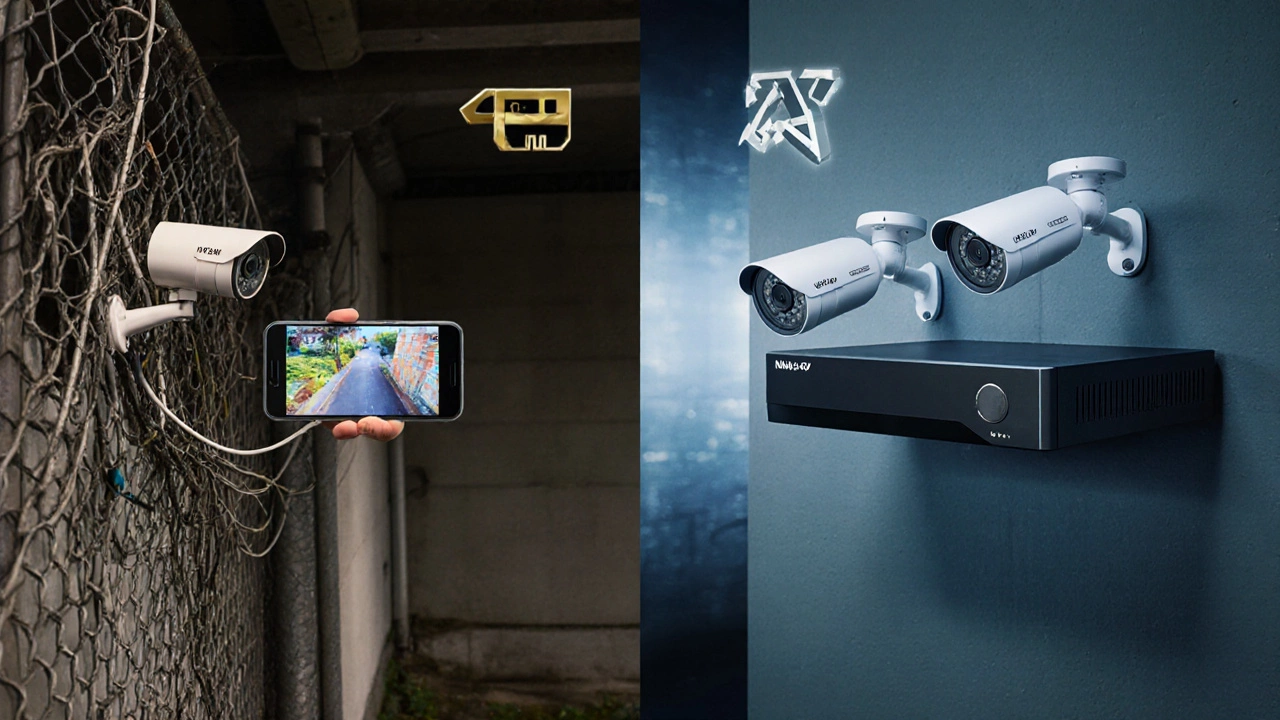
Hidden Costs Nobody Talks About
Most quotes don’t include these - but they should:- Permit fees: Some cities require permits for outdoor cameras. $50-$150.
- Wiring upgrades: If your house is old, you might need new circuits. $200-$800.
- Internet boosters: If your Wi-Fi is weak, you’ll need extenders or mesh nodes. $100-$300.
- AI features: License plate recognition, facial detection, or motion alerts that filter out animals? Add $300-$2,000 per camera.
- Monthly cloud fees: $3-$30 per camera, every month. Forever.
One homeowner in Bristol thought they were getting a $1,500 system. Turned out the quote didn’t include the NVR. They were billed $400 extra after install. That’s why you always ask: “What’s not included?”
Who Should Install It?
For homes: A local contractor with good reviews beats big brands. ADT and Vivint charge more for branding. Independent installers in your area often do better work for less. Look for someone who’s been around for 5+ years. Ask to see their last 3 jobs.For businesses: Go with certified professionals. Look for Network+ or CompTIA certifications. Ask if they’ve installed systems like yours before. Don’t hire a guy who does lawn mowing on the side.
Big names like ADT, Vivint, and Brinks dominate commercial sales. But 58% of residential installs are done by local teams. That’s where you’ll find better pricing and more attention to detail.
How to Save Money - Without Sacrificing Security
You don’t need 16 cameras. You need the right 4.- Put cameras where it matters: front door, back gate, garage, driveway.
- Skip PTZ unless you need to track movement across a large area.
- Use wired cameras, not wireless. They’re more reliable and don’t need battery changes.
- Buy NVR with 2TB storage. That’s enough for 8 cameras for 30 days.
- Wait for Black Friday. Prices drop 20-30% in November and December.
- Check for local grants. In 32 U.S. states, small businesses can get up to 30% back on installation costs through government programs.
And never buy the cheapest camera you can find. A $50 camera with poor night vision is useless. Stick with brands like Hikvision, Dahua, Reolink, or Arlo. They’re not the cheapest - but they’re the ones that actually work.
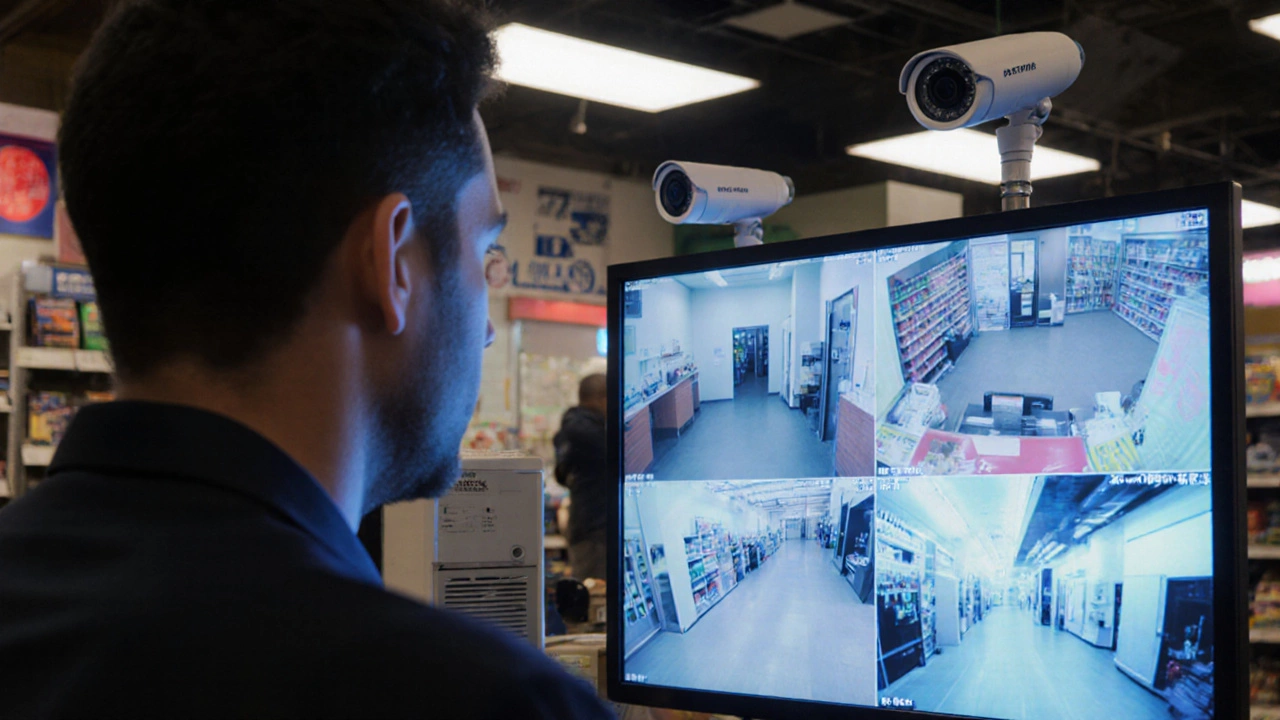
What to Expect on Installation Day
If you hire a pro, here’s what happens:- They survey your property - walk around, point out blind spots.
- They show you where each camera will go - and why.
- They run cables (or set up Wi-Fi) - usually takes 4-8 hours for homes.
- They mount everything, test each feed, and show you the app.
- They give you a checklist: passwords, backup plans, how to reset.
Don’t let them leave until you’ve seen the footage on your phone. If a camera is blurry, or the angle is wrong, make them fix it. No extra charge.
Commercial installs take longer - 1-3 days. They’ll need to shut down areas temporarily. They’ll coordinate with your staff. That’s normal. Ask for a timeline before they start.
Is CCTV Worth It?
Let’s say you spend $2,000 on a system. That’s $400 a year over five years. Or $33 a month.Now think about this: A single burglary averages $2,500 in stolen goods - and that’s just the stuff you can count. Insurance doesn’t cover everything. Emotional loss? Can’t be replaced.
Businesses? A 2025 study found companies with professional CCTV systems lost 47% less to theft. That’s not a luxury. It’s insurance with a camera.
And if you’ve ever waited for police to arrive - knowing someone’s in your house - you’ll understand why this isn’t about fear. It’s about control.
How much does it cost to install 4 CCTV cameras?
For a 4-camera home system, expect $1,200-$2,000 total with professional installation. That includes cameras ($600-$1,000), NVR ($250-$400), mounting, and labor ($400-$800). DIY cuts the cost to $800-$1,000, but you’ll need time and technical skill. Prices vary by region - urban areas cost more.
Is it cheaper to install CCTV myself?
Yes, DIY saves $150-$300 per camera in labor. But only if you know what you’re doing. Most DIYers struggle with Wi-Fi setup, camera angles, and storage. A poorly installed system can fail within a year - and cost more to fix than professional install. Only go DIY if you’ve done similar tech projects before.
Do I need a permit to install CCTV?
It depends on your city and where you’re mounting cameras. If you’re pointing at a neighbor’s property or public sidewalk, you may need a permit. Some areas require permits for outdoor cameras - especially in historic districts. Always check with your local building department. Most installers will know the rules.
How long does CCTV installation take?
For a typical home with 4-8 cameras, expect 4-8 hours. Commercial systems take longer - 1 to 3 days - because of wiring, multiple zones, and integration with alarms. Wireless systems go faster, but wired are more reliable. Always ask your installer for a time estimate before they start.
What’s the best CCTV system for a small business?
A 6-10 camera 1080p system with NVR storage and remote access is ideal. Brands like Hikvision or Dahua offer reliable hardware. Avoid cheap brands - they often have poor night vision or unreliable apps. Include at least one camera covering the entrance, one on the cash register, and one in the back storage area. Make sure the installer can connect it to your phone and set up motion alerts.
Do CCTV cameras need internet?
Not to record. The NVR stores footage locally. But if you want to view live feeds on your phone, get alerts, or use cloud backup, you need internet. A stable Wi-Fi connection is essential. For businesses, wired Ethernet is better than Wi-Fi - it’s more secure and reliable. You don’t need high-speed internet, but 10 Mbps upload is recommended for 4+ cameras.
Can I use old CCTV cameras with a new system?
Only if they’re analog HD (AHD, TVI, CVI) and your new NVR supports them. Old analog (CVBS) cameras won’t work with modern digital systems. You’ll need to replace them. Mixing old and new often causes compatibility issues. It’s usually cheaper and more reliable to replace all cameras at once.
Are wireless CCTV cameras reliable?
They’re convenient - no wires - but not always reliable. Battery-powered models need recharging every 1-3 months. Wi-Fi models drop signals in bad weather or if your router is far away. They’re fine for small homes with strong Wi-Fi. For businesses, garages, or large properties, wired cameras are better. They’re more secure, don’t lose power, and give clearer footage.
Final Thoughts
CCTV installation isn’t a one-size-fits-all purchase. It’s a decision that affects your safety, your peace of mind, and your wallet. Don’t chase the lowest price. Chase the right system for your space.For most homes: $1,500 gets you a solid, professional setup. For small businesses: $3,000-$6,000 is standard. Anything under $1,000? You’re gambling.
Professional installers aren’t overcharging. They’re preventing failure. And in security, failure isn’t an inconvenience - it’s a risk you can’t afford.


